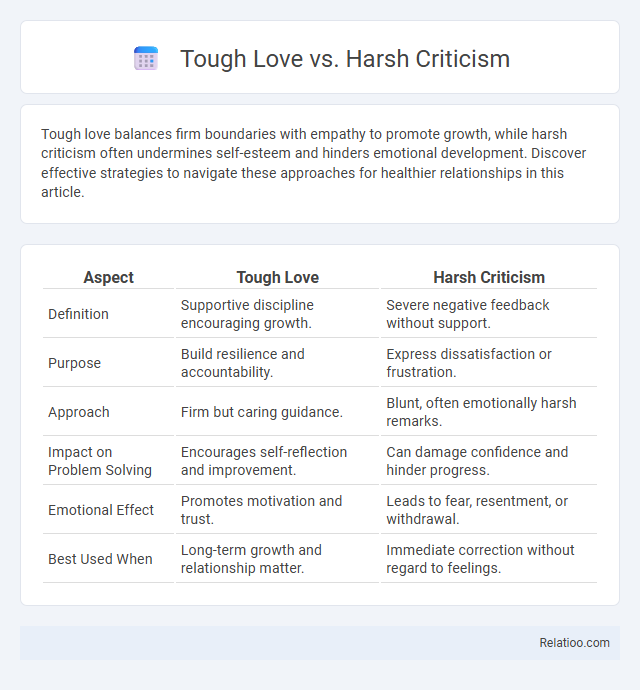Tough love balances firm boundaries with empathy to promote growth, while harsh criticism often undermines self-esteem and hinders emotional development. Discover effective strategies to navigate these approaches for healthier relationships in this article.
Table of Comparison
| Aspect | Tough Love | Harsh Criticism |
|---|---|---|
| Definition | Supportive discipline encouraging growth. | Severe negative feedback without support. |
| Purpose | Build resilience and accountability. | Express dissatisfaction or frustration. |
| Approach | Firm but caring guidance. | Blunt, often emotionally harsh remarks. |
| Impact on Problem Solving | Encourages self-reflection and improvement. | Can damage confidence and hinder progress. |
| Emotional Effect | Promotes motivation and trust. | Leads to fear, resentment, or withdrawal. |
| Best Used When | Long-term growth and relationship matter. | Immediate correction without regard to feelings. |
Understanding Tough Love and Harsh Criticism
Tough love involves setting firm boundaries with the intention of promoting growth and responsibility, emphasizing care despite strictness. Harsh criticism typically focuses on fault-finding and negative judgment without constructive intent, often damaging self-esteem. Understanding the difference highlights that tough love aims for positive change through support, while harsh criticism risks creating resentment and emotional harm.
Key Differences Between Tough Love and Harsh Criticism
Tough love emphasizes setting clear boundaries and expressing care through firm guidance to encourage personal growth, while harsh criticism often involves negative, judgmental comments that undermine self-esteem without supportive intent. Tough love balances firmness with empathy to motivate positive change, whereas harsh criticism tends to focus on fault-finding and blame, which can lead to resentment or reduced confidence. Harshness broadly denotes unkind or severe behavior that may include harsh criticism but lacks the constructive purpose embedded in tough love.
The Psychology Behind Tough Love
Tough love involves setting firm boundaries combined with care to promote personal growth, whereas harsh criticism often focuses on blame without supportive intentions, leading to diminished self-esteem. The psychology behind tough love emphasizes the balance between discipline and emotional support, engaging the brain's regulatory systems to foster resilience and accountability. Neuroscientific studies reveal that tough love activates prefrontal cortex functions linked to self-control, contrasting with harshness that triggers amygdala responses associated with stress and fear.
Negative Impacts of Harsh Criticism
Harsh criticism often damages your self-esteem by focusing on faults without constructive guidance, leading to increased stress and anxiety. Unlike tough love, which encourages growth through support, harshness breaks trust and fosters resentment. The negative impact of such criticism can hinder personal development and strain relationships.
How Tough Love Fosters Personal Growth
Tough love fosters personal growth by balancing empathy with clear boundaries, encouraging accountability and resilience without damaging self-worth. Unlike harsh criticism, which often focuses solely on faults and can diminish motivation, tough love promotes constructive feedback that supports self-improvement. This approach nurtures emotional strength and independence, helping individuals learn from mistakes while maintaining respect and trust.
Recognizing Harsh Criticism in Communication
Recognizing harsh criticism in communication involves identifying language that is overly negative, personal, and lacking constructive feedback, often aimed at belittling rather than improving behavior. Unlike tough love, which combines firmness with care and a goal of positive change, harsh criticism focuses on fault-finding without empathy and can damage relationships and self-esteem. Awareness of tone, intent, and emotional impact helps differentiate harsh criticism from supportive discipline in effective communication.
Setting Boundaries: When Tough Love Goes Too Far
Setting boundaries is crucial when applying tough love to avoid slipping into harsh criticism or outright harshness, which can damage trust and emotional wellbeing. Tough love involves firm but caring limits aimed at fostering growth, whereas harsh criticism often focuses on blame and judgment, leading to resentment. Your ability to balance empathy with discipline ensures that tough love remains constructive without crossing into harmful territory.
Strategies for Delivering Constructive Feedback
Tough love involves setting clear boundaries with empathy, helping Your recipient recognize areas for growth while maintaining respect and support. Harsh criticism often focuses on faults without offering solutions, which can harm motivation and damage trust. Effective strategies for delivering constructive feedback include using specific examples, balancing negative points with positive reinforcement, and emphasizing improvement opportunities to foster development.
Transforming Harsh Criticism into Supportive Guidance
Transforming harsh criticism into supportive guidance requires shifting the focus from blame to constructive feedback that encourages growth and learning. Emphasizing empathy and clear, actionable suggestions fosters an environment where tough love motivates positive change without causing emotional harm. This approach differentiates supportive guidance from harshness by promoting understanding and resilience instead of fear and resentment.
Choosing the Right Approach: Tough Love or Tough Words?
Tough love emphasizes firm but empathetic guidance to foster growth, while harsh criticism often focuses on fault-finding without support, potentially damaging self-esteem. Harshness generally lacks constructive intent, making it less effective and more likely to provoke defensiveness. Choosing the right approach depends on balancing accountability with compassion, ensuring feedback encourages improvement without undermining confidence.

Infographic: Tough Love vs Harsh Criticism
 relatioo.com
relatioo.com